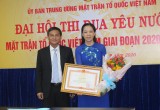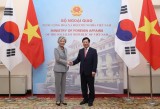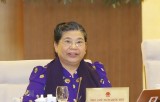The birth place of the first provincial armed force revisited
On getting to Dau Tieng, we were guided by officers of local Division of Culture and Information to visit some local remains of history, culture, and landmark. We were especially impressed on visiting Vuon Trau – a revolutionary remain, where the first Thu Dau Mot provincial armed force was set up by the name of “Tieu doan Phu Loi” (Phu Loi battalion).

The overview of Vuon Trau
Historically marked place
On visiting Vuon Trau revolutionary remains and being introduced about history and formation of Phu Loi Battalion, we knew more about heroic history of the land. Dang Minh Phuoc, Head of Dau Tieng District Division of Culture and Information, informed that Phu Loi Battalion was established in the context of failing ‘special warfare’ of the US Army and its puppet government in Vietnam in the transition to new war strategy – ‘sectional war’. In the face of resistance war requirements, a mighty armed force was in need to combat and eliminate the enemies, effectively assisting guerilla war and political resistance of local people, in 1964, local provincial Party committee decided to set up companies 304, 306, 308 and 4 supporting companies to make up a temporary battalion holding mobility and strength of local armed force.
On such basis, on June 5, 1965, at Vuon Trau village, Ho Men hamlet, Long Nguyen commune, Ben Cat district (now Dong Ba Ba hamlet, Long Hoa commune, Dau Tieng district) was the introduction of Phu Loi Battalion. This was the first mobility and strong force of the then Thu Dau Mot province. At the introduction ceremony, Tran Quoc An, the commander of the then Thu Dau Mot province solemnly read out the decision on setting up Phu Loi Battalion under Regional Military Commanding HQ to include 500 officials, soldiers, and 5 Party cells of 150 members. The Commanding Unit of Phu Loi Battalion included Pham Van Thuan, the Commander, Tran Van Chau, the political member, Truong Van Quan, the Deputy Commander, Nguyen Van Sinh, the Deputy Commander and Pham Van Dau, the Deputy Commander.
As introduced by Dang Minh Phuoc, the main mobility force of the province was formed in the pride of local people and armed force as the leader of local armed force; thus all-level Party committees, authorities and people joined up to assist its establishment. By such assistance and trust, Phu Loi Battalion grew tremendously in all aspects to become the victor of local combat. Ever since its establishment, Phu Loi Battalion had won various victories and eliminated many enemy’s forces. The battalion had strictly followed its motto of enemy elimination and victory at battles. In its time, Phu Loi Battalion had shot down hundreds of tanks and planes, captured thousands of enemies and tens of thousands of weapons.
The name of Phu Loi Battalion was attached to battles against the US Army and its puppet government at historic landmarks. Its first battle was coordinated with Dau Tieng Company 64 and Thanh An commune guerilla to eliminate a unit of the enemy. Other merit victories of Phu Loi Battalion were namely Dong So battle at Dong So hamlet (now Bau Bang district) on December 28, 1964, Dong Cheo base, Quy Hiep battle on February 21, 1965, and the ambush on July 8, 1965 at Suoi Dua to eliminate all unit commanders including 4 US consultants, capture 49 hostage soldiers and 270 guns.
Everlasting pride
In historical battles of Phu Loi Battalion, the combat on August 25, 1966 at Bong Trang – Lo Gach was a return raid of extreme. In the battle, Phu Loi Battalion eliminated and heavily exhausted 3 US companies of 700 soldiers. Phu Loi Battalion force also shot down 16 tanks and 1 aircraft before collecting 20 guns and other military items. In victories, the mentioned victory has always been the pride of generations of officers and soldiers of Phu Loi Battalion as well as local people. In the general offensive of 1975 spring, Phu Loi Battalion continued to fulfilled its assignments, significantly contributing to the glorious victory of 1975, liberating the South and unifying the nation.
In years, the place has become a meaningful landmark for aimed visits helping education of revolutionary spirit and patriotism of generations. Every year, the site also welcomes visitors doing research of history and visits from departments, unions, and localities inside out.
Reported by Cam Ly – Translated by Vi Bao
 Vietnam – Malaysia relations develop strongly in new period
Vietnam – Malaysia relations develop strongly in new period
 Youth Union enhances propaganda on all-level Party Congress
Youth Union enhances propaganda on all-level Party Congress
 Provincial Party Committee announces personnel decisions
Provincial Party Committee announces personnel decisions
 Provincial delegation pays working visit to Germany
Provincial delegation pays working visit to Germany
 Provincial People's Council Chairman takes part in "Morning Coffee - Exchange with people" in Hiep Thanh ward
Provincial People's Council Chairman takes part in "Morning Coffee - Exchange with people" in Hiep Thanh ward
 Honoring traditional values, strengthening solidarity
Honoring traditional values, strengthening solidarity
 Igniting, promoting the strength of great national solidarity
Igniting, promoting the strength of great national solidarity
 State President concludes official visit to Peru, attendance at APEC Leaders’ Week
State President concludes official visit to Peru, attendance at APEC Leaders’ Week
 State President’s Chile, Peru trip a success: official
State President’s Chile, Peru trip a success: official
 PM’s trip to bolster Vietnam-Brazil comprehensive partnership
PM’s trip to bolster Vietnam-Brazil comprehensive partnership




